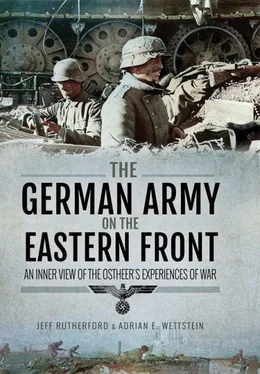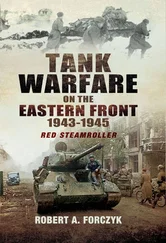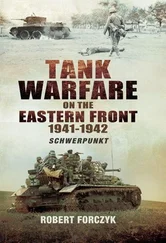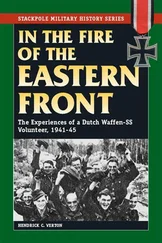German losses in the east were enormous – and continual. In 1942, for example, German monthly casualties exceeded 70,000 in nine months. In this year, the German replacement system could forward more troops than the Ostheer lost in only eight months. But when it did so, it never surpassed an additional 30,000 men. On the other side, January 1942 alone saw losses of over 214,000 men, while the Ostheer received only 43,800 replacements; the heavy fighting in August 1942 cost the Ostheer over 250,000 losses, while not even 90,000 replacements arrived in the east. [24]These massive losses forced the German army to lower training and recruiting standards. While part of that could be compensated for by field training, the quality of replacements decreased. The actual strength of the German Ostheer never again reached its peak strength of 22 June 1941 (3.3 million men). While primarily allied units helped to rebuild the strength of the Ostheer for the 1942 summer offensive, their destruction in 1942/43 forced the Germans to send more men in spring 1943. Before Operation Citadel, the German army in the east could field nearly 3.15 million men, but from then on – with pressure from the Western Allies rapidly increasing – German strength fell sharply. [25]Combined with a decrease in training quality, this led directly into the defeats of late 1943 and 1944.
Chapter 7
The German Army’s Understanding of the War in the East: Ideology and Motivations
In January 1943, the German southern wing in the Soviet Union teetered on the edge of catastrophe. In addition to the Sixth Army slowly dying in the rubble of Stalingrad, elements of Army Group A that had been struggling to seize the oil fields of the Caucasus region had not only been checked, but now faced their own encirclement. For one German non-commissioned officer deployed in the Caucasus, the crisis that faced the German army led to a brutal interpretation of the conflict. In a letter to his wife, he wrote:
Does war actually have its own laws? I read now ‘Not everyone that saith unto me “Lord, Lord,” enters into Heaven, but rather those who do the will of my Father in Heaven.’ Just now, an elder came to me, someone took his pig. Now he wants to have at least something from it. In any case, he lost his pig. Of course it is for our kitchen, but this is hard for those who affected by it. Should I now give my people less to live on to spare the civilian population? Or am I obligated to care for the men so that they live as well as possible? In general, one says that war has its own law. Thus, the case is settled… You see, the war brings not only a re-evaluation, but a revolution in the moral sphere. [It] has its own law? [1]
For this NCO, the war in the east had developed into one that existed outside the normal parameters or understandings of conventional conflicts. Such an understanding, however, did not necessarily indicate a fervent belief in Nazi ideological tenets; rather it was based on preserving his men in a theatre of war which demanded a brutally utilitarian approach to the civilians in his midst. While his thoughts, doubts, and reflections on the war do not represent every German soldier’s approach to the war against the Soviet Union, his conviction that this conflict was indeed different from the army’s other campaigns would certainly have been shared by the majority of his comrades who served on the Eastern front.
With the exception of the Japanese war in China, the German–Soviet theatre of war witnessed the longest continuous fighting of the war between armies. It also surpassed all of the war’s other conflicts in terms of totality and scale. The army’s initial belief that victory would be achieved quickly was soon punctured by the challenges of the eastern theatre, which had failed to materialize in any of the Germans’ previous campaigns: terrain and climate difficulties that served to magnify each other; increasingly long and tenuous supply lines as covered in chapter 6; and, most importantly, as chapter 1showed, an opponent that was prepared to fight just as savagely and desperately as the Germans to achieve victory. This chapter will investigate how the German army and men such as the NCO deployed in the Caucasus understood their task in the east, how they viewed the Red Army, and in what ways the army strove to keep its men in the field. This necessitates an examination of the army’s behaviour in the Soviet Union and what drove it to act in such a way.
Immediately after the conclusion of the war, military commentators tried to solve one of the conflict’s great puzzles: how did an out-gunned and out-manned German army manage to hold out for so long against such great odds? The early answers to this question dismissed the importance of ideas in motivating German soldiers; rather, notions of primary group solidarity – fighting for one’s closest comrades – predominated. [2]This focus on professionalism also diverted attention from the army’s participation in the war of annihilation. Instead, German crimes in the Soviet Union were blamed on the SS and other Nazi organizations, while the army was generally portrayed as an apolitical entity that had merely carried out its professional duty by fighting a ‘clean’ war in the east. This view was crafted by numerous former high-ranking German officers who published memoirs of their service, as well as historians sympathetic to their post-war fate. [3]The growing tensions of the Cold War only reinforced this narrative as the United States looked to integrate a rearmed West Germany into the western bloc. It was only from the late 1960s that historians began to uncover the army’s complicity in Hitler’s war of annihilation; by the 1980s it was clear that the army had participated on a massive scale in the Vernichtungskrieg . [4]The primary question asked by historians during the twenty-first century has concerned the ‘why’ instead of the ‘what’. Why did the army as an institution and the soldiers themselves stay in the fight until Germany was completely and utterly defeated, and why did both groups commit war crimes?
Historians have identified several different possible answers to these questions. According to one perspective, ideology served to cement German soldiers to the cause, providing them with the necessary mental and spiritual foundation to sustain the war effort some two years after it was clear the Third Reich would be defeated. This same ideology also served to legitimize ruthless behaviour against enemy combatants and civilians, who were seen as not only racially inferior to the German Herrenmenschen , but who also threatened to destroy Western civilization with their Jewish-Bolshevik ideals. [5]Another approach focuses on the professionalism of the German army and the soldier in carrying out their duty. This view holds that German soldiers of all ranks internalized the military ethos that demanded the fulfilment of their mission of defending the Reich from its enemies. [6]Such a perspective is closely tied with emphases on the patriotism of soldiers determined to fight for their country and family. [7]Finally, the idea of military necessity has also been advanced as an explanation for the army’s conduct on the Eastern front. In its attempt to emerge victorious on the battlefield, the army resorted to whatever practices and policies it viewed as necessary at a given time. By subscribing to this idea, the army alternated between periods of conciliatory and violent, coercive behaviour towards the Soviet civilian population. [8]Any examination of why and how the army – and by extension its soldiers – conducted itself needs to be put into the context of these four approaches and their interconnections.
The German officer had traditionally been responsible for the care of his men and this included their morale and mental state. [9]Based on its experiences of the First World War, however, the army realized that such efforts needed to be intensified within the context of modern, industrialized war. As the war shifted to a total one during the course of 1916, the army leadership recognized that the total mobilization of the nation’s resources for the war effort included the minds of its soldiers. [10]The rationale behind this new emphasis on a soldier’s psyche was spelled out by the commander of the 8th Panzer Division during the course of the truly total war waged during the Second World War. [11]
Читать дальше






![John Stieber - Against the Odds - Survival on the Russian Front 1944-1945 [2nd Edition]](/books/405234/john-stieber-against-the-odds-survival-on-the-russian-front-1944-1945-2nd-edition-thumb.webp)





